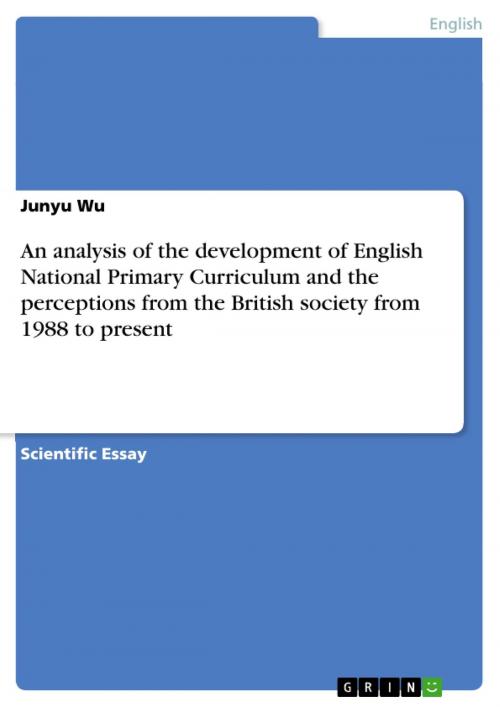An analysis of the development of English National Primary Curriculum and the perceptions from the British society from 1988 to present
Nonfiction, Reference & Language, Study Aids, ESL, Foreign Languages| Author: | Junyu Wu | ISBN: | 9783656056614 |
| Publisher: | GRIN Verlag | Publication: | November 16, 2011 |
| Imprint: | GRIN Verlag | Language: | English |
| Author: | Junyu Wu |
| ISBN: | 9783656056614 |
| Publisher: | GRIN Verlag |
| Publication: | November 16, 2011 |
| Imprint: | GRIN Verlag |
| Language: | English |
Scientific Essay from the year 2010 in the subject English Language and Literature Studies - Culture and Applied Geography, grade: 74, Glasgow International College, course: British Culture, language: English, abstract: From the early 1990s, the poor quality of pupils' primary education drew a lot of attention from the government and the general public. According to some official statistics from Ofsted (the Office for Standards in Education, as cited in Oakland, 2006), in 2005 more than half of primary students lacked some basic and fundamental skills such as reading, writing and arithmetic after leaving state primary schools. More recently, it aroused a controversial debate among the sociologists towards the issue that limited working conditions, underpaid staff and restricted syllabus in some elementary schools can also lead to low degree standards of primary education (Oakland, 2006). In this case, the British government had to re-specify the National Primary Curriculum (NPC) as efficiently as possible to enhance the pupils' quality of education as a whole to resolve the problem of low standards of literacy and numeracy in inadequate primary education (ibid). It is very necessary to make the general public recognize the significance of primary education, and how important the NPC is. The focus of this report is on the changes regarding the development of the NPC throughout history, and the viewpoints from the British society towards its changes. In this report, it will firstly illustrate the history of primary curriculum briefly from 1988 to present. Afterwards, it will analyze the changes of the NPC about specific subjects. Then, it will investigate the reasons why it has been changed continuously and the perspectives from different individuals and organizations among the society before generating a conclusion with several usable recommendations.
Scientific Essay from the year 2010 in the subject English Language and Literature Studies - Culture and Applied Geography, grade: 74, Glasgow International College, course: British Culture, language: English, abstract: From the early 1990s, the poor quality of pupils' primary education drew a lot of attention from the government and the general public. According to some official statistics from Ofsted (the Office for Standards in Education, as cited in Oakland, 2006), in 2005 more than half of primary students lacked some basic and fundamental skills such as reading, writing and arithmetic after leaving state primary schools. More recently, it aroused a controversial debate among the sociologists towards the issue that limited working conditions, underpaid staff and restricted syllabus in some elementary schools can also lead to low degree standards of primary education (Oakland, 2006). In this case, the British government had to re-specify the National Primary Curriculum (NPC) as efficiently as possible to enhance the pupils' quality of education as a whole to resolve the problem of low standards of literacy and numeracy in inadequate primary education (ibid). It is very necessary to make the general public recognize the significance of primary education, and how important the NPC is. The focus of this report is on the changes regarding the development of the NPC throughout history, and the viewpoints from the British society towards its changes. In this report, it will firstly illustrate the history of primary curriculum briefly from 1988 to present. Afterwards, it will analyze the changes of the NPC about specific subjects. Then, it will investigate the reasons why it has been changed continuously and the perspectives from different individuals and organizations among the society before generating a conclusion with several usable recommendations.















